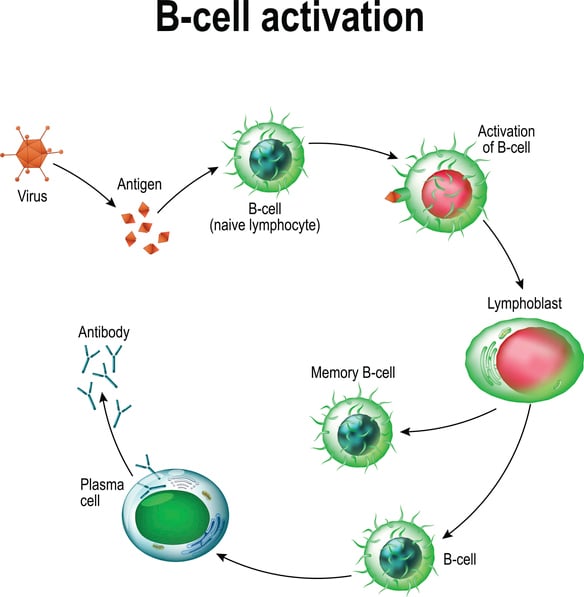Describe How Antibodies Are Used to Eliminate Antigens
Mainly antigens like toxins of bacteria virus snake venom etc are neutralized by antigen and make them ineffective. Where antibodies are used to remove a particular antigen from a mixture.
4117 which are more readily phagocytized than are free antigens.

. I did an assignment where I had to list all the antibodies and antigents but I have too clarify the use of each one and their biological role so please help me do that since I dont have the book for this class. Invading microorganisms have antigens. Antibodies are often used on chromatography columns in an affinity purification step.
Opsonisation- enhancing phagocytosis by macrophages. The following points highlight the top five techniques used for detecting antigens in the serum. The four mechanisms that is used by the the antibody to make antigen harmless are A.
Cross-linked antigen-antibody complexes agglutinate. 2 Antibodies activate the complement system to destroy bacterial cells by lysis punching holes in the cell wall. Similar to Agglutination antibodies can remove pathogens from the body by merely inducing a chemical reaction between the soluble antigens and antibodies and forming a solid insoluble mass which isolates efficiently from the bodily fluids.
3 Antibodies facilitate phagocytosis of other substances by phagocytic cells. B cells attack and eliminate viruses and other toxins outside the cell. Phagocytosis This is quite similar to the previous mechanism.
They bind to antigens and promote the elimination of threatening pathogens from the body. Immunoglobulins or l g are another name for antibodies. Understanding the factors that impact the pharmacokinetics of monoclonal antibodies is of high importance for effective therapy.
A As a germ-line B cell matures an enzyme called DNA recombinase randomly excises V and J segments from the light chain gene. Antibodies block sites on viruses prevents antigens from binding to receptors on tissue cells then the antigen-antibody complex undergoes phagocytosis. An antibody has at least two binding sites that can bind to specific epitopes on antigens.
Describe the 3 step process of neutralization. Enzyme-Linked Immunosorbent Assay 4. Fluorescent Antibody Technique 3.
Evaluation of these factors will facilitate the understanding of the processes involved in antibody elimination. This test will only work with complement fixing antibodies IgG and IgM are best. Antibodies have three main functions.
Antibodies possess at least two antigen-binding sites and most antigens have at least two epitopes antigenic determinants. On their surface that the human body can recognise as being foreign - meaning not belonging to it. Another way that antibodies inactivate antigens is by agglutination.
Complement Fixation Test 2. This is used in the process of negative selection. Every antigen has several epitopes.
The ability of the body to act against the disease-causing agents and antigens by the immune system is termed as the immunity. Antibodies are created by cells within the immune system. There are several ways that antibodies inactivate antigens.
Such types of antibodies are often called as antitoxins. 1 Antibodies are produced into the blood and mucosa there they bind to and inactivate substances like pathogens and toxins. Splicing at the mRNA level results in further gene rearrangement.
This can also be used to deplete a sample of a particular antigen by using the flowthrough. Tests for antigenantibody complexes that rely on the consumption of complement are termed complement fixation tests and are used to quantitate antigenantibody reactions. Phagocytes will clear out the neutralised antigen-antibody complexes.
The antibodies cross-link antigens forming large aggregates of antibody and antigen referred to as immune complexes Fig. Antibody binds the same determinant on more than one cell-bound antigen binds cells together. The antibody binds to the antigen on an intruder or an abnormal infected cell the pink cell in the image.
Theyre Y -shaped proteins produced by B lymphocytes or B cells in our immune system. As a result b each antibody has a unique variable region capable of binding a different antigen. We review their content and use your feedback to keep the quality high.
This happens when the antibody binds to the antigen and covers it so that it can no longer cause an immune response. Immunoprecipitation assays In immunoprecipitation assays antibodies help label and precipitate target antigens from an aqueous solution. These antibodies collect antigens and remove them from your body in your mucus or.
2 Antibodies activate the complement system to destroy bacterial cells by lysis punching holes in the cell wall. By this process it blocks the site on the pathogen where it uses to innervate the target cell. This acts as a flag for other immune cells that can produce chemicals that kill the unwanted target cell.
The antigens combine with the antibody according to the lock and key mechanism. The principle of the complement fixation test is illustrated in Figure 24. They do this by developing antibodies that are specific to a single antigen.
In these techniques primary antibodies are used to bind to target antigens and conjugated secondary antibodies are used to detect the antigen-primary antibody complex. They neutralize the threat by alerting other parts of the immune system to take over. How antibody class finctions to eliminate antigens.
Only in this case the antibody bound to an antigen recruits phagocytes. Antibodies block specific sites on viruses_____antigens are then not able to bind to receptor on tissue cells-----antigen antibody complexes undergo phagocytosis. Many factors related to the target antigen antibody and patients can affect antibody elimination.
Its pretty much neutralization. These are the first antibodies made by B cells in response to antigens. One way is by neutralising the antigen.
Please if you describe the use of antibodies or antigens used for elisa test listed above and the biological role. What does agglutination do. 1 Antibodies are secreted into the blood and mucosa where they bind to and inactivate foreign substances such as pathogens and toxins neutralization.

Antigen Vs Antibody What Are The Differences Technology Networks

No comments for "Describe How Antibodies Are Used to Eliminate Antigens"
Post a Comment